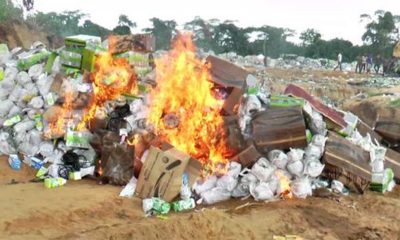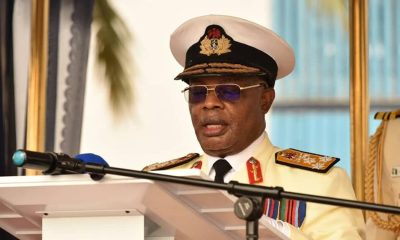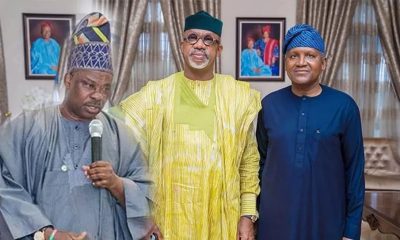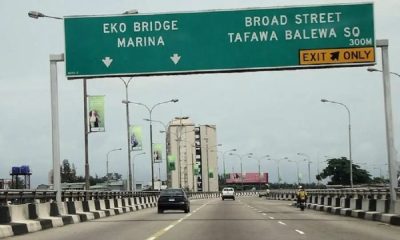Business
Dangote to FG: Make Law to Jail Sellers of Smuggled Textiles Without Option of Fine

•Wants Nigeria to target 20% manufacturing contribution to GDP in 10yrs
•Utomi: Textile industry victim of poor trade policy
The President of Dangote Group, Alhaji Aliko Dangote has thrown his weight behind the clamour for the revival of Nigeria’s ailing textile and manufacturing sectors by urging the National Assembly to pass a law that would penalise sale of banned textiles materials by imprisoning culprits without any option of fine.
Dangote made call yesterday, in Lagos, while presenting the Second Adeola Odutola Lecture titled, “Agenda Setting for Industrialising Nigeria in the Next Decade,” in commemoration of the 50th Annual General Meeting (AGM) of the Manufacturers Association of Nigeria (MAN).
He said: “For the textile industry, I think the government needs to formulate a law by the National Assembly that will say that anybody selling banned foreign textile must go to prison without an option of fine. So, it will be just going to jail even if it is just for two years.
“The real problem in the textile industry is not basically lack of cheaper power. If you give them cheaper power but allowed the smuggling to continue the textile will not last.
“What is happening is that foreign companies are using us (Nigeria) as a dumping ground. That is why I do not like to import. Anytime you import you will be importing poverty and exporting prosperity and job opportunities outside.”
READ ALSO:
- Army Launches New Exercise In Kogi, Vows To Smoke Out Criminals
- China opens police station in Nigeria
- We’ll make Sanwo-Olu jobless, Lagos PDP tells Wike
- WAEC announces plan to release certificates with results
He said government should apply the same force it mustered to enforce the ban on rice importation in the bid to end smuggling of textiles into Nigeria, adding that, “few decades ago textiles used to be the largest employer of labour after the federal government of Nigeria.”
Dangote, who is Africa’s richest man, also tasked the federal government on the implementation of its policies meant to protect the country’s industrial sector, especially textile manufacturing, without caring who would be offended.
He said as at today people would be sent to jail in India for selling foreign textiles anywhere.
“Also, if something is banned in the United States of America for example, there is no way it could be displayed for sale in a shop.
“But what is stopping the implementation of Nigeria’s government policies is the absence of the political will to make sure that we implement those policies no matter who is going to be upset by us,” Dangote said, adding that manufacturers should “meet with the government to find a lasting solution, especially now that government is desperate about job creation, to stamp out smuggling for our industries to stand. If we have a prosperous environment the insecurity will drop.”
He also said Nigeria should focus on enabling its manufacturing sector to achieve the following targets within the next 10 years.
“Nigeria needs to henceforth intensify efforts at promoting industrialisation with specific focus on the attainment of the following targets in the next 10 years: 15 per cent manufacturing growth; 20 per cent manufacturing contribution to the GDP; 15 per cent growth in export of manufactured products; 10 per cent increase in the share of manufacturing to total export machandise, stronger inter-industry linkage between SMEs and large corporations, improved manufacturing contribution to government tax revenue and 20 per cent increase in manufacturing employment,” he said.
Commenting on the comatose state of the country’s textile industry, the Founder of the Centre for Values in Leadership, Prof. Pat Utomi, ascribed the decline in textile manufacturing to bad trade policies.
Utomi said: “But to get straight to the point, the textile industry failed because of Nigeria’s trade policy. The lesson we shall take from this is that we should have a standing working group consisting of some real experts and manufacturers to put the government under pressure about its trade policies.
“I wonder if we still remembered that Nigeria Textile Limited (NTL) break even within one month of its operation in 1960. And in its first six months of production was exporting to Manchester, United Kingdom.
“So, why did the textile industry die? Because wrong trade policies where being made and there was not enough pressure to get the government to do the right thing.
“And the government people were not doing it out of wickedness but ignorance. So, we have to remember that Nigeria is our country and collectively we can get the experts, manufacturers and the government to sit together and plot our way.
“The global textile industry today is dominated by five firms. How can Nigeria align with them and provide incentives to them to make Nigeria their base? So that today we cannot be talking about jobs because the textile industry will be providing millions of jobs.”
The President of MAN, Mr. Mansur Ahmed, said in his welcome address that the choice of Dangote as the guest speaker for the lecture was, “clearly predicated upon our belief that only experienced industrialists are well equipped to do justice to the theme, visibly highlight essential advocacy issues, suggest workable solutions and point the sector to key industrial development agenda for the next ten year.”
Thisday
Aviation
Aviation workers threaten nationwide airports shutdown over Customs officer assault

Aviation workers threaten nationwide airports shutdown over Customs officer assault
Aviation unions have announced plans to shut down airports across Nigeria starting March 31 in protest against the failure to remove a customs officer who allegedly assaulted the Director of Aviation Security at the Federal Airports Authority of Nigeria (FAAN).
In a joint statement signed by Ocheme Aba (NUATE), Frances Akinjole (ATSSSAN), and Abdul Rasaq Saidu (ANAP), the unions condemned the repeated physical assaults on FAAN staff, vowing not to tolerate such incidents any longer.
The unions also called on the government to urgently reduce the number of customs officers operating within the aviation sector, aligning with global best practices. They warned that if their demands are not met, they will proceed with the nationwide shutdown, potentially disrupting air travel and operations.
The statement reads: “Considering the enormity and frequency of physical and psychological assault on the staff and management personnel of FAAN, of which there is no end in sight, we are compelled to inform the management of the unwavering determination of our unions to cause the establishment of a clear framework of mutual respect among FAAN staff and the security agencies operating at the airports.
READ ALSO:
- Over 100 suspects arrested in Abuja Ponzi Scheme Academy raid
- Again Obasanjo accuses federal lawmakers of bribery
- FG to pay corps members backlog of delayed N77,000 allowance
“Consequential sanctions are in place which guarantee the safety and human rights of FAAN staff. We shall direct all the workers to withdraw from the airports with effect from March 31, 2025, pending when such protocols are established.
“The recent assault on no less a personality than the Director of Aviation Security of FAAN is one too many, which leaves a taste too bitter to swallow. It is our sincere hope that our demand in the above respect is well met to avoid the industrial conflagration that will ensue in the absence of acceptable remedial actions.”
In response, Abdullahi Maiwada, the spokesperson for Customs, stated in a recent release that the disagreement between FAAN officials and officers of the Nigeria Customs Service (NCS) stemmed from a miscommunication over equipment movement and seating arrangements.
Aviation workers threaten nationwide airports shutdown over Customs officer assault
Business
SEC announces stricter measures to protect investors
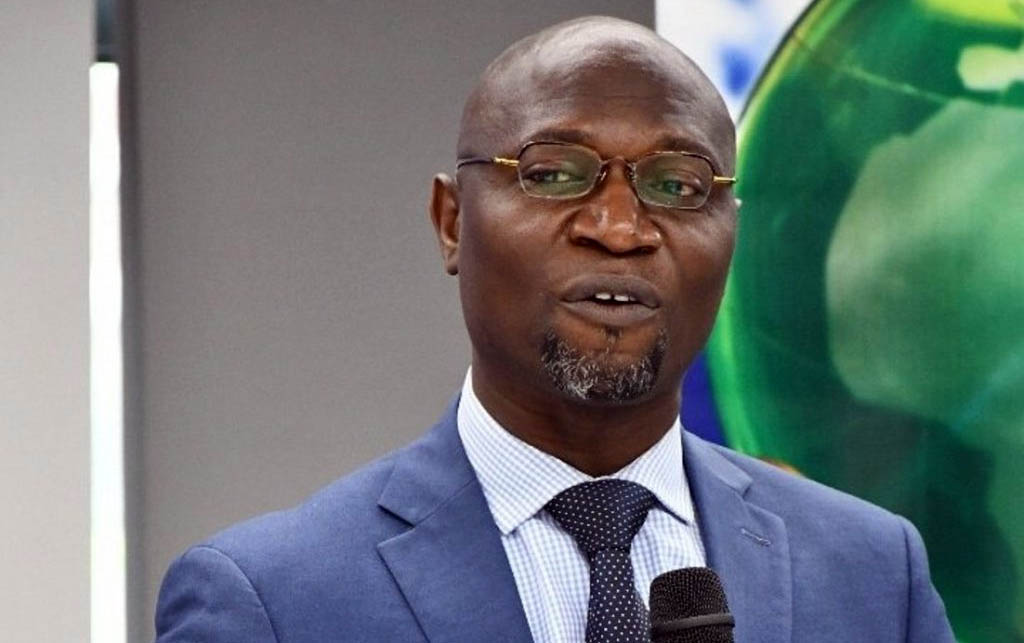
SEC announces stricter measures to protect investors
The Securities and Exchange Commission (SEC) has reaffirmed its commitment to protecting investors in Nigeria’s capital market by cracking down on fraudulent activities.
According to the Director-General of SEC, Dr. Emomotimi Agama, operators engaging in unscrupulous practices will face strict penalties as the Commission prioritizes safeguarding investor interests.
“So, clearly for us, it is getting people to understand that there is no hiding place anymore for anybody that has the intention to defraud Nigerians and to defraud anybody that is investing in this market,” Dr. Agama stated, emphasizing the Commission’s zero-tolerance policy.
READ ALSO:
- Why postgraduate students are ineligible for FG loan – NELFUND
- Bitcoin rises above $86,000 as crypto market gains momentum
- 2 Nigerians in US face heavy jail term over fraud
Dr. Agama highlighted that the Investments and Securities Act (ISA) 2007 serves as the framework for securities regulation in Nigeria, ensuring that market operators adhere to high ethical standards.
He emphasized the importance of the “fit and proper person’s test,” which requires operators to meet specific regulatory criteria to maintain their licenses.
“This is because the very ethics of regulating or registering a securities market operator is in the principle of the fit and proper person’s test,” he explained.
“What you have been seeing most recently by the revocation of licenses, the suspension of operators and our follow-up to operators that are not registered with the SEC is only a tip of the iceberg as to what we intend to do this year.”
Dr. Agama assured stakeholders that the SEC will leverage its regulatory powers under Nigerian law to deter fraudulent activities, noting, “We believe strongly that a protected investor is a powerful investor.”
SEC announces stricter measures to protect investors
Business
Bitcoin rises above $86,000 as crypto market gains momentum

Bitcoin rises above $86,000 as crypto market gains momentum
Bitcoin and other leading cryptocurrencies extended their gains on Monday, buoyed by positive investor sentiment despite concerns over upcoming U.S. tariffs and key economic data releases later this week.
As of 7am WAT, Bitcoin rose 3.2% to $86,590, while Ethereum gained 2.3%, trading at $2,047.
The global cryptocurrency market capitalization increased by 2.94% in the past 24 hours, reaching $2.84 trillion.
Other notable performers included XRP, Cardano, and Dogecoin, which posted gains of 3%, 2%, and 3.8%, respectively. Chainlink, Avalanche, Hedera, and Stellar recorded growth ranging from 3% to 10%.
“Bitcoin is holding above $86,000, registering a 3% gain today. The key resistance level to watch is $86,700; a breakout could pave the way for $90,000,” said Vikram Subburaj, CEO of Giottus.
Bitcoin’s market capitalization surged to $1.727 trillion, with dominance rising to 60.73%. Its 24-hour trading volume soared by 93% to $18.2 billion, while stablecoin transactions accounted for 94.74% of total crypto trading, reaching $57.58 billion, according to CoinMarketCap.
READ ALSO:
- 2 Nigerians in US face heavy jail term over fraud
- Canada denies 13,000 Nigerians refugee status
- Lagos Govt to redesign Oshodi motor park for rail integration
Solana Outperforms Peers Amid Positive Market Sentiment
Solana (SOL) emerged as a standout performer, surging over 7% in the past 24 hours to trade above $139.
The rally was fueled by reports suggesting that President Trump’s April 2 tariffs may be more targeted than initially feared, easing market concerns.
Weekend rumors indicated that the tariffs might include country exemptions and non-cumulative charges on metals, contributing to improved sentiment across global markets.
The Federal Reserve’s projections for two rate cuts this year further supported risk assets, with the central bank describing potential tariff-induced inflation as “transitory.”
BitMEX co-founder Arthur Hayes expressed optimism about Bitcoin’s trajectory, stating, “The Fed’s policy orientation could help Bitcoin achieve $110k before it retests $76.5k.”
Solana’s momentum aligns with unprecedented acceptance rates. DeFiLlama reported that Solana’s total value locked (TVL) reached 54.87 million SOL, its highest level since June 2022. Ali Charts revealed that a record 11.09 million addresses now hold SOL, underscoring growing adoption.
Bitcoin rises above $86,000 as crypto market gains momentum
-

 metro2 days ago
metro2 days agoCourt refers Ojukwu property case to alternative dispute resolution
-
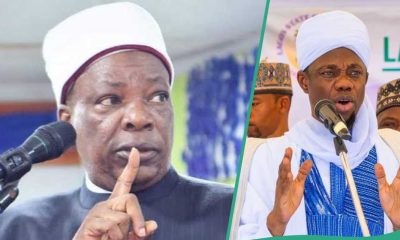
 metro19 hours ago
metro19 hours agoAttack on Mufty of Ilorin: Onikijipa Family Charges Stakeholders to Call Sheikh Habibullahi Al-Ilory to Order
-

 Entertainment3 days ago
Entertainment3 days agoSome ladies in movie industry ready to sleep their way to fame — Jide Kosoko
-
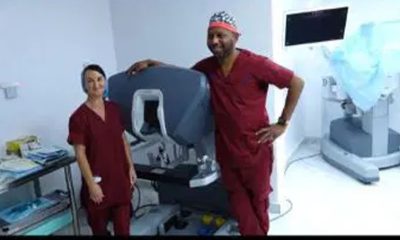
 Health1 day ago
Health1 day agoNigerian doctor pioneers W’Africa first robotic prostate cancer surgery
-
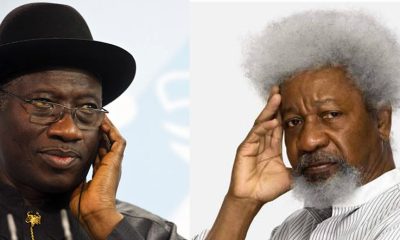
 metro3 days ago
metro3 days agoPresidency blasts Jonathan, Soyinka over comments on emergency rule in Rivers
-
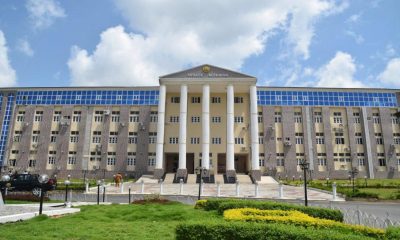
 metro3 days ago
metro3 days agoAdeleke University didn’t suspend Muslims for praying – MSSN
-
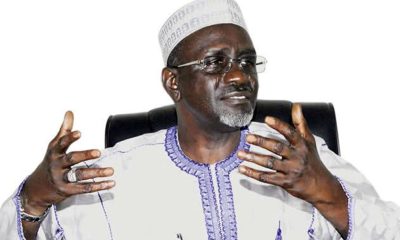
 Politics3 days ago
Politics3 days agoAtiku, Obi, El-Rufai’s coalition can’t unseat Tinubu – Shekarau
-

 metro2 days ago
metro2 days agoCBN rejects Osun nomination of ex-Aregbesola’s commissioner as bank director

